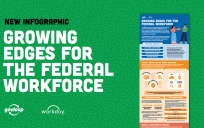My friend Bob Davis at MILVETS was kind enough to forward a link to the article 2020 vision: 10 things you’ll see on the Web in the next 10 years by Shawn McCarthy in the January 26 Government Computer News. While McCarthy’s list holds few surprises, I would have made number 10 number one:
10. Government interactions with the public makes a tectonic shift. Many people in their teens and 20s do not read the newspaper nor view government notices that arrive in the mail. They get all of their news and other information online or via their cell phones. This demographic shift, coupled with the climbing cost of paper printing, means that more government business will move online, including setting up accounts and log-in information for everyone who wants to do business with your agency. Because people of various skill levels will start logging on, agencies will need to collect demographic information to make decisions on what data to display and how to help with information navigation.
In other words, “meat and potatoes” government-public transactions will continue moving online, not only in the name of “transparency” but also because it’s just cheaper and easier for the government to do it that way.
This may sound mundane, but it’s not. The massive Federal budget deficits we face will have to be addressed through a combination of initiatives, including budget cuts, increasing “partnerships” with the private sector, likely tax increases — and making it impossible to deal with some Federal agencies other than online.
Today’s focus on “open government,” data accessibility, and transparency may, in other words, be quickly overshadowed by a rapid movement to automate basic services that now require heavy — and costly — manual support.
The process will be painful. But it’s inevitable. In the end, we’ll all benefit. There will be bumps along the way as the movement of government services to the web accelerates.
One large bump will be the need for Federal agencies to seriously consider how to reorganize their operations so that currently-siloed internal fiefdoms don’t hinder effective service re-engineering to take advantage of automation. Multiple departments that service the public but don’t share information will have to be swept aside.
Will this acceleration of Federal public service automation be a blessing in disguise? That’s up to us. We’ll have to take into account past lessons learned (painfully) during automation of private sector public services, including the need to plan strategically, to move quickly, to accommodate a wide range in public abilities, and to stay focused on core processes, not frills.
Copyright (c) 2010 by Dennis D. McDonald. Originally published on Dennis McDonald’s Web Site.




I hope so…simple things like how banks for years have pushed people into paperless statements and people of a certain demographic and tech savvy-ness do not want paper…When I get gov’t notices by mail, I hate it and don’t know what to do.
My filing cabinet is old and disorganized. But my computer/backup and online storage is way better.
For example, send me a notice to renew not just by paper but allow me to choose via email, text, etc…